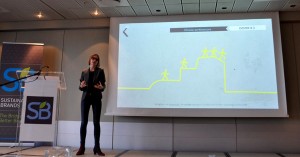The “Awareness” Trap, are we even aware of it? For decades and since the movement towards a “greener” world, sustainability-driven businesses and organizations have been trying to achieve one goal and one goal only: to change consumer behaviour from purchasing and using traditional and conventional goods towards green or greener goods. Sille Krukow, founder of Krukow Behavior Consulting, asked these two questions: Do you want to live a long and healthy life? And do you want to leave behind a better world for your children? Most people would answer yes, but the real question is would they really follow through with what they say they will do? As expected, many people would agree that their behaviour does not always live up to their words. However, this is where company and organization brand plays a role in helping people connect the dots from their words to their actions.
Currently, companies and organizations have been measuring their success of converting people into “green” purchasers through “awareness” as they hope to reach out to consumers and help them to live more sustainable lives that correspond to their ideals. “Awareness” would be measured with questions such as “how many people saw our ‘green’ campaign? “How many hits did we get?” And “how many people liked our message?” At the end of the day, “victory” is only defined to the extent of motivation and imparting knowledge and is not enough to propel the “green” movement. The hidden root of the problem is that brands assume consumers to be “perfect”, and what they mean by that is that consumers will take the knowledge that they have received and act upon it. In reality, they do not follow through because they are distracted with numerous other tasks in life to care about one more thing. With businesses and organizations trying to help consumers switch to more sustainable behaviour purely through raising awareness, the outcome just becomes another form of green washing. But fear not, this is where behavioural economics comes in.
Behavioural economics deals with how choices are presented to consumers and examines the environments in which decisions are made. In traditional stores and supermarkets, choice architecture usually focuses solely on revenue maximization, ie. Products that bring the greatest profits are those that are in the “hotspots”, where purchases are most likely to occur. With behavioural economics, stores and supermarkets can explore opportunities to change their choice architecture and gear it towards the goals in sustainability, ie. Making it easier for consumers to differentiate and select sustainable options, changing store environment, layout, and design, and incorporating “nudges” such as associated smell, sound, or color. At the end of the day, behavioural consultants and green companies and organizations need to identify consumers’ underlying goals and use techniques such as a cost-benefit analysis to determine which nudges will instigate the greatest change and effect incurring the smallest expense. Only then will there be real change in consumer behaviour towards sustainability.



Great post Daniel! I’ve actually talked about this in one of my posts – about how awareness is good, but it’s not good enough sometimes. I agree with you that the strategy in your post about how maybe changing a store’s layout and environment can affect consumers’ behaviours and make them choose sustainable products. However, I think the most important thing is that the sustainable products have to be of high-quality and must provide a tangible benefit other than the fact that it’s good for the Earth. I think changing the layout is a good idea, but the product itself has to be worth purchasing for consumers to really affect purchasing behaviour!